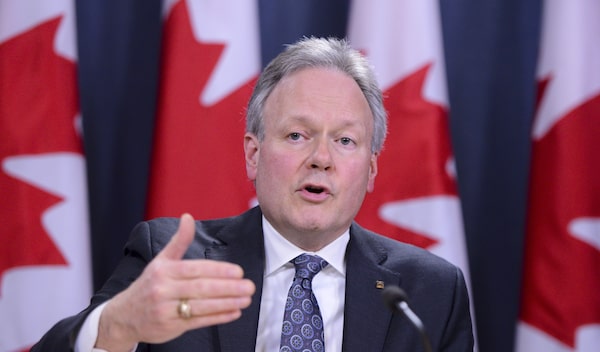
Bank of Canada Governor Stephen Poloz takes part in a press conference at the National Press Theatre in Ottawa on March 13, 2020.Sean Kilpatrick/The Canadian Press
Bank of Canada Governor Stephen Poloz believes Canada’s economy remains on track for a healthy recovery this year from the COVID-19 crisis, despite the steady flow of discouraging economic headlines in recent weeks.
“I do think that, on balance, the flow [of pessimism] that I’m hearing is a little too dire. It’s a little overblown,” Mr. Poloz told reporters in a video-conference roundtable Thursday.
“Where we are today suggests we’re still tracking to our best-case scenario … not the ‘dire’ scenario. I know a lot of people don’t want to subscribe to it, because they fear a worse scenario.”
He was referring to the two scenarios for an economic recovery that the central bank outlined in its quarterly Monetary Policy Report last month. The bank’s base case is a relatively optimistic one that the economy will rebound fairly sharply and quickly in the second half of the year. The pessimistic case – which Mr. Poloz has often referred to as the “dire” scenario – envisions more prolonged containment measures or a second wave of shutdowns that would inflict deeper and more lasting damage on the economy.
Since the report, economic data stemming from the shutdowns, including deep employment declines and projections of a severe downturn in gross domestic product in the second quarter, have contributed to dark projections from many quarters. But Mr. Poloz argued that too many economists and other observers have fixated on the bleak numbers rather than the unique nature of the downturn.
“I think that it’s this notion of GDP has got us too preoccupied. Yes, production has fallen, a lot. But underneath that, there’s not the behavioural adjustment by people which is normally associate with a recession or depression, a downward spiral in confidence," Mr. Poloz said. "There’s very little reason for that to happen, or to be correlated even with the decline in GDP, because we just shut off the economy. And then [the federal government] put income supports to make sure people are cushioned for it.”
“So afterwards, when we turn the economy back on – which we’re just beginning to do – you should see a very rapid return of production,” he said. “If we’ve done a good job, it will have been cushioned well – the shock absorbers have been put in place, and people can pick up where they left off.”
“After that, yes, we’ll have some legacy to work off, and it could take us a year or more to get back to the [economic] trend line we were on before. I don’t deny this at all. But I’m relatively optimistic … compared to what the talk is,” he said.
With less than two weeks until the end of his seven-year term on June 2, Mr. Poloz held the video-conference as a last chance to speak directly with a group of reporters who have been with him for much, if not all, of his tenure. The conversation ranged from the pressing economic and monetary-policy issues of the current crisis to reflections on the sometimes rollercoaster ride guiding the bank over those seven years – culminating in what has been one of the most hectic and challenging two months in central banking history.
A relaxed Mr. Poloz even found time for a bit of levity about the current circumstances, which imposed video conferencing technology on the Bank of Canada’s press corps.
“One of the things we know for sure at the bank is that the economic recovery will start the day everybody learns where the mute button is,” he quipped. “Just remember where you heard that.”
Video calls and teleconferences have been a big part of Mr. Poloz’s life over the past two months, as the crisis fuelled profound economic and financial turmoil, waves of tough policy decisions and round-the-clock global consultations that placed heavy demands on the governor and his team.
“These last eight or nine weeks have been terrible,” he said. “It’s been frenetic, and it hasn’t really eased up.”
“But in the end, I’m very proud of how the bank responded,” he said. “I think we’ve got reason to be optimistic, because we really have a well-targeted response, on all fronts.”
Nevertheless, Mr. Poloz acknowledged that the forced shutdowns will leave some irreversible scars on the business sector. “There is going to be some destruction as a result of this – some companies just won’t make it through,” he said.
But he believes the crisis is already unleashing innovation and new business practices that will give birth to a wave of new companies to fill the void. “Companies and people are learning a lot about themselves, and about how business works,” he said.
“I think we’re going to see a wave of new small-company creation, with great new ways of doing things, like we haven’t seen in a very long time.”
Your time is valuable. Have the Top Business Headlines newsletter conveniently delivered to your inbox in the morning or evening. Sign up today.
 David Parkinson
David Parkinson